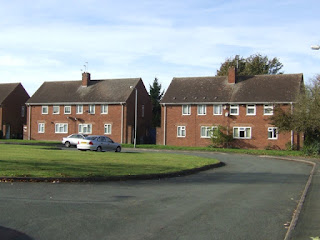 |
| Quality council housing form the 1960s, when land was for use, not investment. Photo copyright John M and licensed for reuse under this Creative Commons Licence |
In conventional market terms, the deal makes sense. The houses are old and in poor condition, but their location in expensive areas makes them valuable. So why not sell them and put the money into new, low maintenance replacements?
But conventional does not mean right, and the the anger is justifiable for two reasons. First, if these houses are desirable to people who want to buy them and do them up, then why could they not be desirable to council tenants, too?
The second reason is more fundamental. If you want to create affordable housing, the easiest way is to sell houses for less. But just as huge swathes of London's once-social housing have been sold into the private sector by cash-strapped local authorities because the land is so valuable, so Bristol is milking the stratospheric housing market to bring in as much money as it can from these properties.
High land values are the primary reason for the housing crisis. Land accounts for two thirds or so of the price of housing, which is what makes it unaffordable. Developers create artificial shortages in the supply of new houses to maximise the value of their landbanks.
If local authorities want affordable housing, they need to drive prices down, not feed the flames of a raging market. That means providing housing land at less than its market value and ensuring through legal covenants that it remains so for ever. A sufficient quantity of houses and flats provided on such terms would eventually bring prices down on the open market, too.
In this case, Bristol could have sold its houses at a substantial discount, to people willing to forego investment value in favour of a cheaper place to live. Under the terms of the sale, the discount would carry through to future owners, providing affordable houses for generations to come.
For sure it would have made less money, but there would still have been some to spend on new housing, while 14 newly affordable houses would have been instantly created at the stroke of a pen.
The second reason is more fundamental. If you want to create affordable housing, the easiest way is to sell houses for less. But just as huge swathes of London's once-social housing have been sold into the private sector by cash-strapped local authorities because the land is so valuable, so Bristol is milking the stratospheric housing market to bring in as much money as it can from these properties.
High land values are the primary reason for the housing crisis. Land accounts for two thirds or so of the price of housing, which is what makes it unaffordable. Developers create artificial shortages in the supply of new houses to maximise the value of their landbanks.
If local authorities want affordable housing, they need to drive prices down, not feed the flames of a raging market. That means providing housing land at less than its market value and ensuring through legal covenants that it remains so for ever. A sufficient quantity of houses and flats provided on such terms would eventually bring prices down on the open market, too.
In this case, Bristol could have sold its houses at a substantial discount, to people willing to forego investment value in favour of a cheaper place to live. Under the terms of the sale, the discount would carry through to future owners, providing affordable houses for generations to come.
For sure it would have made less money, but there would still have been some to spend on new housing, while 14 newly affordable houses would have been instantly created at the stroke of a pen.
Comments
Post a Comment